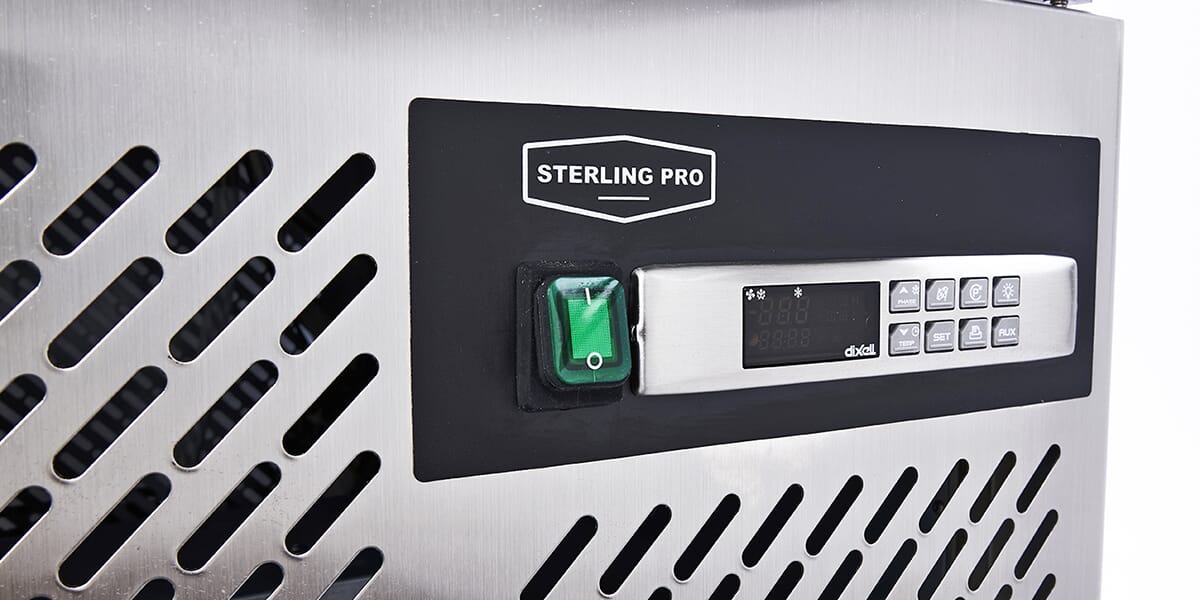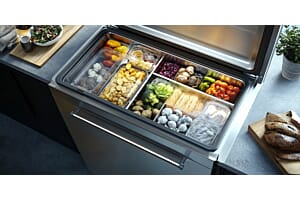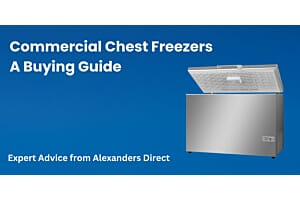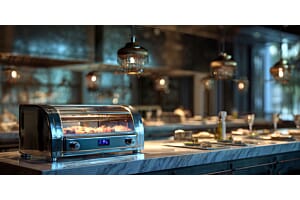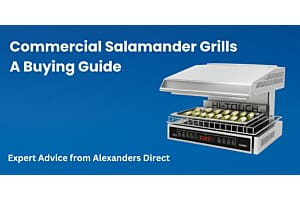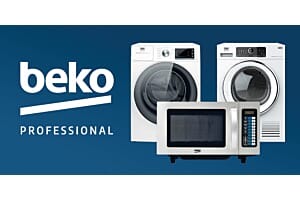Welcome to the ultimate commercial guide on
Blast Chillers & Freezers. If you work in the food industry, you know how important it is to have high-quality
commercial refrigeration equipment. Blast chillers and freezers are designed to rapidly cool and freeze food, ensuring optimal
food preservation, and safety in commercial kitchens in the UK.
In this guide, we will explore the definition, benefits, types, proper use, regulations, and
maintenance of
Blast Chillers & Freezers. We will also provide guidance on choosing the right equipment for your specific commercial kitchen needs and analyzing the cost implications of investing in these appliances.
Key Takeaways:
- Blast chillers and freezers are essential commercial refrigeration equipment for rapidly cooling and freezing food, ensuring optimal food preservation and safety
- These appliances offer numerous benefits, including improved food safety and efficiency, and cost savings for businesses in the UK
- Proper installation, maintenance, and use of Blast Chillers & Freezers are crucial to ensure optimal performance and longevity
- Choosing the right equipment for your commercial kitchen, considering factors such as size, capacity, features, energy efficiency, and budget, is essential
- Compliance with food safety regulations and guidelines is necessary to maintain high standards of hygiene and ensure the safety of your food
What are Blast Chillers & Freezers?
If you work in commercial kitchens in the UK, you may have heard of blast chillers and freezers. These innovative appliances have revolutionised the way food is preserved and stored, allowing for
rapid cooling and freezing of cooked or raw food items.
Blast chillers and freezers are designed to reduce the temperature of cooked food from 70°C to 3°C or below within 90 minutes, while freezers can freeze food from room temperature to -18°C in under four hours. This
rapid cooling or freezing process ensures
food safety and quality by minimizing bacterial growth and preventing moisture loss.
By using blast chillers and freezers, you can extend the shelf life of your food items and reduce the risk of contamination, thus ensuring safe consumption for your customers. These appliances are widely used in commercial kitchens across the UK, from restaurants and hotels to hospitals and supermarkets.
What is Rapid Cooling?
Rapid cooling is a process of quickly reducing the temperature of cooked or raw food items to minimize the risk of bacterial growth and to preserve the texture, flavor, and nutrient content of the food. Blast chillers and freezers can accomplish this by creating a blast of cold air or using a fan to circulate cold air around the food.
This method of rapid cooling has significant advantages over traditional cooling, which can take several hours and lead to increased bacterial growth and loss of quality in the food. Rapid cooling also minimizes condensation, which can cause the formation of ice crystals on the surface of the food, ultimately affecting its texture and quality.
Blast chillers and freezers are essential pieces of
commercial refrigeration equipment that enable foodservice operators to preserve the quality and safety of their food items while also improving efficiency in the kitchen.
The Benefits of Blast Chillers & Freezers
Blast chillers and freezers are essential pieces of
commercial refrigeration equipment that offer numerous benefits for businesses in the UK. Rapid cooling preserves the quality and freshness of food, extending its shelf life and reducing waste. But the advantages of these appliances go beyond just
food preservation.
Improved Food Safety: Blast chillers and freezers enable you to safely store food at the optimal temperature, reducing the risk of bacterial growth and contamination. Proper
temperature control is crucial for food safety, and blast chillers and freezers help you achieve this in a reliable and consistent way.
Enhanced Efficiency: By reducing the time it takes to cool or freeze food, blast chillers and freezers can help improve the efficiency of your kitchen operations. You can prepare larger batches of food in advance and store them safely until needed, reducing preparation time and enabling you to cater to customer demand more effectively.
Cost Savings: By reducing food waste and spoilage, blast chillers and freezers can help you save money in the long run. You can buy ingredients in bulk and store them safely for longer periods, minimizing the need for frequent restocking and reducing the overall cost of your catering supplies.
Flexible Applications: Blast chillers and freezers can be used for a wide range of food items, from cooked meals to raw ingredients, desserts and baked goods. They are suitable for use in various types of commercial kitchens, such as restaurants, cafeterias, bakeries, and supermarkets.
Improved Product Quality: Rapid cooling and freezing help preserve the texture, flavour, and appearance of food. This is especially important for delicate items such as seafood, fruits, and vegetables that can quickly deteriorate if not cooled or frozen properly.
By investing in blast chillers and freezers, you can improve the efficiency,
food preservation, and safety of your commercial kitchen, ultimately boosting your bottom line and enhancing customer satisfaction.
Types of Blast Chillers & Freezers
Blast chillers and freezers are available in various types, depending on the capacity, size, and specific requirements of your commercial kitchen setup. Here are some of the most common types of blast chillers and freezers:
| Type |
Description |
| Countertop Blast Chillers/Freezers |
Compact units designed for smaller kitchens with limited space. These models are ideal for batch chilling or freezing small quantities of food. |
| Undercounter Blast Chillers/Freezers |
Similar to countertop models but designed to fit neatly underneath a kitchen counter. These appliances offer a slightly higher capacity than their countertop counterparts. |
| Reach-In Blast Chillers/Freezers |
Larger units with a capacity of up to 150 kg, designed to accommodate larger batches of food. These models typically come with adjustable shelves and are available in one, two or three door configurations. |
| Walk-In Blast Chillers/Freezers |
Huge units that can accommodate pallets or trolleys of food. These models are custom-built to fit specific kitchen spaces and are ideal for high-volume operations. |
When considering the type of blast chiller or freezer to buy, it's important to take into account the size of your kitchen, the volume of food you handle, and the frequency of use.
Blast Chillers and Freezers: Countertop vs. Undercounter
If you have a smaller kitchen or limited space, a countertop or undercounter model may be the right choice for you. Countertop models are compact and can store small quantities of food, while undercounter models fit neatly underneath your existing kitchen counter without taking up much space. Both types are easy to move around, making them convenient for smaller operations.
However, if you have a bigger volume of food to cool or freeze, you should consider a reach-in or walk-in model, which offers a larger storage capacity and is better suited for high-volume operations.
Choosing the Right Blast Chiller or Freezer
Investing in the right blast chiller or freezer is essential to optimize the efficiency and food safety of your commercial kitchen. Here are some factors to consider when selecting the perfect appliance:
- Size: The size of the unit should be appropriate for the amount of food and kitchen space you have available. Consider the capacity of the unit and ensure it fits comfortably in your kitchen area.
- Features: Look for features such as easy-to-use controls, digital displays, and automatic defrost cycles. Additional features such as humidity control and programmable cycles may be beneficial depending on your specific needs.
- Energy Efficiency: Energy-efficient models can help reduce your energy consumption and ultimately save you money on utility bills over time. Look for units with high energy efficiency ratings and features such as doors that close automatically to keep cool air in.
- Budget: Determine your budget before making a purchase and ensure that you get the best value for your money. Consider factors such as upfront costs, ongoing maintenance, and potential energy savings.
When it comes to choosing between a blast chiller or freezer, consider the type of food you handle and the desired storage times. Blast chillers are best for rapidly cooling food to prevent bacterial growth and preserve freshness, while freezers are better suited for long-term storage of already chilled or frozen items.
Remember to consult with a professional when selecting and installing your blast chiller or freezer to ensure proper installation and avoid any potential issues.
Installation and Maintenance of Blast Chillers & Freezers
Proper installation and maintenance of blast chillers and freezers are crucial to ensure their optimal performance and longevity. These essential pieces of commercial refrigeration equipment require regular servicing and cleaning to maintain their efficiency and uphold food safety standards. Here are some tips to help you install and maintain blast chillers and freezers in your commercial kitchen.
Installation
When installing blast chillers and freezers, ensure that they are placed in a well-ventilated area, away from heat sources, and preferably on a level surface. Follow the manufacturer's instructions carefully to ensure proper installation and avoid any damage to the equipment. Consult a professional refrigeration engineer if necessary to ensure that the appliance is installed correctly and that all the necessary electrical and plumbing requirements are met.
Maintenance
Regular maintenance of blast chillers and freezers is essential to ensure their optimal performance and longevity. Here are some tips to help you maintain your commercial refrigeration equipment:
- Regularly check the temperature of the appliance to ensure it is functioning correctly. If you notice any irregularities, call a refrigeration engineer promptly.
- Clean the appliance regularly to avoid any build-up of dirt or residue. Ensure that you use appropriate cleaning materials and follow the manufacturer's instructions carefully.
- Check the door seals for any signs of wear or damage, and replace them if necessary to ensure that the appliance is airtight.
- Keep the evaporator coils clean to maintain the efficiency of the appliance and prevent any ice build-up.
- Replace any faulty or damaged parts promptly to avoid any further damage to the appliance.
Regular servicing and maintenance of blast chillers and freezers will help extend the lifespan of the equipment and ensure their continued efficiency, contributing to improved food safety and reduced food waste in your commercial kitchen.
Blast Chillers & Freezers: Best Practices
Using blast chillers and freezers in your commercial kitchen can offer various benefits such as preserving food quality and enhancing food safety. However, it is essential to follow best practices to ensure you get the most out of these appliances.
Here are some tips to help you use blast chillers and freezers effectively:
- Prepare food for chilling or freezing quickly. Food should be packaged in an airtight container or wrapped in a moisture-proof material before being placed in the blast chiller or freezer.
- Ensure that your blast chiller or freezer is not overloaded - follow the capacity guidelines provided by the manufacturer.
- Use accurate temperature control settings to ensure that food is chilled or frozen to the required temperature, reducing the risk of bacterial growth.
- Allow food to cool to room temperature before placing it in the blast chiller or freezer.
- Use blast chillers and freezers strictly for their intended purpose and ensure that they are cleaned and maintained regularly to avoid contamination.
- Train your staff on the proper use and handling of blast chillers and freezers, emphasizing the importance of food safety.
Implementing these best practices will help ensure that your food is preserved at the highest quality and safety standards.
Blast Chillers & Freezers: Food Safety Regulations
When it comes to blast chillers and freezers, complying with food safety regulations is essential for businesses operating in the UK. Failure to adhere to these guidelines can result in fines, legal action, and reputational damage.
The Food Standards Agency (FSA) provides detailed regulations for the safe use of blast chillers and freezers in commercial kitchens. These regulations outline the importance of proper
temperature control, hygiene, and storage practices to prevent the growth of harmful bacteria and ensure the safety of food.
It is recommended that blast chillers and freezers are properly cleaned and sanitized before and after each use to prevent cross-contamination and maintain food safety standards. Additionally, it is important to ensure that these appliances are regularly serviced and maintained to prevent breakdowns and maintain optimal performance.
By adhering to food safety regulations and implementing best practices for the use of blast chillers and freezers, businesses can ensure that their food is safe for consumption and maintain the trust of their customers.
Blast Chiller & Freezer Brands in the UK
When it comes to purchasing blast chillers and freezers for your commercial kitchen, it's essential to choose a reputable brand that offers high-quality products and reliable customer support. Here are some of the top blast chiller and freezer brands available in the UK market:
1. Sterling Pro
Sterling Pro is a well-established UK brand that specialises in commercial refrigeration equipment, including blast chillers and freezers. Their products are known for their
energy efficiency, durability, and superior performance. Foster Refrigeration offers a range of blast chiller and freezer models to suit different kitchen setups and needs.
See our range of Sterling Pro Blast Chillers & Freezers.
2. Diamond Refrigeration
Diamond Refrigeration is another brand that provides a wide range of commercial refrigeration equipment, including blast chillers and freezers. Their products are designed to offer excellent
temperature control, energy efficiency, and durability. Diamond Refrigeration has a reputation for providing reliable customer support and after-sales service.
See our range of Diamond Blast Chillers & Freezers.
3. Foster Refrigeration
Foster Refrigeration is a brand that is well-known for its high-quality commercial refrigeration equipment, including blast chillers and freezers. Their products are designed to offer precision and consistency in temperature control, ensuring optimal food safety and quality. Foster blast chillers and freezers are available in different sizes and configurations to suit various kitchen setups.
See our range of Foster Refrigeration Blast Chillers & Freezers.
4. Tefcold
Tefcold is a brand that specialises in commercial refrigeration and
catering equipment. Their range of blast chillers and freezers is designed to offer high performance, energy efficiency, and ease of use. Tefcold products are known for their reliability and durability, making them a popular choice in the UK market.
See our range of Tefcold Blast Chillers & Freezers.
View our full range of Blast Chillers and Freezers.
Whichever brand you choose, ensure that their product line meets your specific needs and requirements, and that their equipment is properly certified and meets regulatory standards for safety and food hygiene.
Blast Chillers & Freezers: Maintenance Tips
Ensuring the proper maintenance of your blast chillers and freezers is crucial to their longevity and continued effectiveness. Here are some tips to help you maintain and troubleshoot your commercial refrigeration equipment:
- Check the seals: Regularly examine the door seals of your blast chiller or freezer to ensure they are clean and tight. Worn or damaged seals can cause air leaks, leading to inefficient cooling and increased energy consumption. Replace any damaged seals promptly.
- Clean the condenser coils: Dirty condenser coils can impede airflow, reducing the effectiveness of your blast chiller or freezer. Clean the coils regularly using a soft brush or vacuum cleaner to remove any dust or debris.
- Monitor temperature: Regularly check the temperature of your blast chiller or freezer to ensure it remains at the optimal level for food safety and preservation. Adjust the temperature controls as necessary to maintain the desired temperature.
- Defrost regularly: Ice buildup can reduce the efficiency of your blast chiller or freezer and lead to equipment damage. Defrost your equipment regularly to prevent ice buildup. Refer to the manufacturer's instructions for defrosting procedures.
- Inspect and clean the interior: Regularly inspect the interior of your blast chiller or freezer for any signs of damage or wear. Clean the interior using a mild detergent and warm water to remove any spills or stains.
- Keep equipment level: Ensure that your blast chiller or freezer is level and stable to prevent any vibrations or movement that may damage the equipment or affect its performance.
- Train staff: Train your staff on proper handling and use of blast chillers and freezers to reduce the risk of equipment damage or breakdown. Encourage them to report any issues or malfunctions promptly.
- Service regularly: Schedule regular servicing of your blast chiller or freezer with a qualified technician to ensure optimal performance and identify any potential issues before they cause equipment damage or failure.
By following these simple maintenance tips, you can ensure the continued efficiency and effectiveness of your blast chillers and freezers, reducing downtime and costly repairs and ensuring optimal food safety and preservation for your customers.
Blast Chillers vs. Freezers: Which One Do You Need?
When it comes to blast chillers and freezers, it's important to understand the differences between the two and determine which one is best for your commercial kitchen needs. Both blast chillers and freezers are designed to rapidly cool and freeze food, but they serve different purposes and offer distinct benefits.
Blast chillers are primarily used for the rapid cooling of hot food, typically from 70°C to 3°C in 90 minutes or less. This process helps to preserve the quality and freshness of the food, extending its shelf life and reducing the risk of bacterial growth. Blast chillers are ideal for kitchens that deal with a high volume of food, as they allow for efficient food production and storage.
On the other hand, freezers are used for long-term storage of food, keeping it at a temperature of -18°C or lower to prevent the growth of bacteria and preserve the food's nutritional value. Freezers are beneficial for commercial kitchens that require large-scale storage of frozen foods, such as meat, fish, and vegetables.
When deciding which appliance to invest in, consider the types of food you handle, your desired storage times, and the specific needs of your kitchen. A blast chiller may be more appropriate for a restaurant that serves freshly prepared meals, while a freezer may be necessary for a supermarket that requires extended storage of frozen goods.
Ultimately, both blast chillers and freezers are essential tools for maintaining food safety and quality in commercial kitchens. By integrating these appliances into your setup, you can ensure that your food is preserved at the correct temperature and remains fresh for longer periods of time.
Blast Chillers & Freezers: Cost Analysis
Investing in blast chillers and freezers for your commercial kitchen can offer numerous benefits, but it’s important to consider the cost implications.
Firstly, the initial purchase cost of blast chillers and freezers can vary greatly depending on the size, capacity, and features of the appliance. However, it’s important to remember that investing in high-quality commercial refrigeration equipment is a long-term investment that can ultimately save you money in the long run.
Secondly, energy consumption is a significant factor in the overall cost of blast chillers and freezers. Energy-efficient models may have a higher initial cost, but can result in significant long-term savings in energy bills. Make sure to look for appliances with the Energy Star label, which indicates they meet strict energy efficiency guidelines.
Maintenance expenses are another important consideration. Regular servicing and cleaning of blast chillers and freezers are crucial to maintain optimal performance and extend their lifespan. Make sure to factor in these expenses when considering the overall cost of these appliances.
Lastly, investing in blast chillers and freezers can ultimately lead to cost savings in terms of food waste reduction. By preserving the quality and freshness of your food, you can reduce the amount of food that needs to be thrown away, ultimately reducing costs.
| Factors to Consider |
Cost Implications |
| Initial purchase cost |
Varies depending on size, capacity, and features |
| Energy consumption |
Energy-efficient models may cost more initially, but can lead to long-term savings in energy bills |
| Maintenance expenses |
Regular servicing and cleaning are crucial to maintain optimal performance and extend lifespan |
| Food waste reduction |
Preserving food quality and freshness can lead to cost savings by reducing the amount of food that needs to be thrown away |
Overall, blast chillers and freezers are a worthwhile investment for commercial kitchens in the UK. By considering the various cost implications and benefits, you can make an informed decision that ultimately leads to improved efficiency, food safety, and cost savings for your business.
Blast Chillers & Freezers in Different Industries
Blast chillers and freezers are essential pieces of
catering equipment that offer a range of benefits across various industries. Let's take a closer look at how different sectors can benefit from using these appliances.
Restaurants and Catering
In the fast-paced world of catering and restaurant operations, rapid cooling and food preservation are critical for maintaining food quality and safety. Blast chillers and freezers offer a quick and efficient way to cool or freeze food, reducing the risk of bacterial growth and extending the shelf life of prepared dishes. These appliances are ideal for batch preparation and high-volume kitchens, ensuring that food is always fresh and safe to serve.
Hotels and Hospitality
Hotels and other hospitality industries often have a high demand for food storage and preparation. Blast chillers and freezers help to optimize the efficiency of kitchen operations by enabling chefs to prepare food in advance and store it for later use without compromising quality. These appliances also allow for more efficient use of space, as they can store a higher volume of food in a smaller area than traditional refrigeration units.
Hospitals and Healthcare
In healthcare facilities, food safety and hygiene are of utmost importance. Blast chillers and freezers can help to ensure that food is always stored at the correct temperature and prevent the spread of harmful bacteria. These appliances are also useful for preparing special diets for patients with specific nutritional requirements, allowing for efficient batch cooking and storage.
Supermarkets and Retail
Supermarkets and other retail food outlets can benefit from using blast chillers and freezers for both food preparation and display purposes. These appliances can help to reduce food waste by allowing for extended storage times and preventing food spoilage. They can also be used to create attractive displays of chilled or frozen food items, enhancing the overall customer experience.
Conclusion
Regardless of the industry you operate in, blast chillers and freezers offer numerous benefits for commercial kitchen operations. From improved food safety to increased efficiency and cost savings, these appliances are a worthwhile investment for any business that handles food on a regular basis.
Blast Chillers & Freezers: Environmental Impact
Blast chillers and freezers play a critical role in commercial food preservation and safety, but they also have an impact on the environment. Energy consumption is a significant concern for these appliances, as they require a high amount of power to operate effectively.
However, many manufacturers now offer energy-efficient models that can help reduce the environmental impact of blast chillers and freezers. These appliances use advanced technology, such as variable speed compressors and improved insulation, to lower energy consumption and reduce greenhouse gas emissions.
Aside from investing in energy-efficient models, there are other ways that businesses can reduce the environmental impact of blast chillers and freezers. Regular maintenance is crucial to ensure optimal performance and prevent energy wastage. Simple tasks such as cleaning condenser coils and replacing worn-out door gaskets can help improve efficiency and reduce energy consumption.
Businesses can also implement best practices to minimize the use of blast chillers and freezers. For example, ensuring that food is at the correct temperature before being placed in the appliance can reduce the amount of energy required to reach the desired temperature. Proper organization and planning can also help reduce the need for excessive chilling or freezing.
In conclusion, blast chillers and freezers are essential pieces of
catering equipment that have an impact on the environment. By investing in energy-efficient models and implementing best practices for maintenance and use, businesses can reduce their carbon footprint and contribute to sustainability in the foodservice industry.
Blast Chillers & Freezers: Conclusion
In conclusion, blast chillers and freezers are essential pieces of commercial refrigeration equipment that offer numerous benefits for businesses in the UK. By rapidly cooling and freezing food, these appliances ensure optimal food preservation, safety, and quality in commercial kitchens.
Incorporating blast chillers and freezers into your kitchen setup can improve efficiency, reduce food waste, and enhance food safety compliance. Choosing the right model based on factors such as size, capacity, and features is crucial to maximize the benefits of these appliances.
Proper installation, maintenance, and best practices for using blast chillers and freezers are essential to ensure their continued efficiency and longevity. Compliance with food safety regulations is also crucial for maintaining high standards of hygiene and ensuring the safety of your food.
While blast chillers and freezers may require an initial investment, the potential cost savings in terms of food waste reduction and improved efficiency make them a worthwhile investment for businesses in the foodservice industry.
Overall, blast chillers and freezers have a wide range of applications across different industries, from restaurants and hotels to hospitals and supermarkets. By investing in energy-efficient models and adopting sustainable practices, businesses can also contribute to reducing the environmental impact of their foodservice operations.
FAQ
What are blast chillers and freezers?
Blast chillers and freezers are innovative commercial refrigeration appliances designed to rapidly cool or freeze food, ensuring optimal food preservation and safety in commercial kitchens.
What are the benefits of using blast chillers and freezers?
Incorporating blast chillers and freezers into your commercial kitchen setup offers numerous advantages, including improved food safety, enhanced efficiency, and cost savings.
What types of blast chillers and freezers are available?
There are various types of blast chillers and freezers available in the market, ranging from countertop models to walk-in units, allowing you to choose the option that best fits your commercial kitchen's specific needs and space requirements.
How do I choose the right blast chiller or freezer for my commercial kitchen?
When selecting a blast chiller or freezer, factors such as size, capacity, features, energy efficiency, and budget should be considered to ensure you make an informed decision.
What are the installation and maintenance procedures for blast chillers and freezers?
Proper installation and regular maintenance, including servicing and cleaning, are essential to ensure optimal performance and longevity of blast chillers and freezers.
Are there any best practices for using blast chillers and freezers in a commercial kitchen?
Yes, there are best practices for using blast chillers and freezers effectively, including proper handling of food before and after chilling, and ensuring accurate temperature control, to maximize the benefits of these appliances.
What food safety regulations apply to blast chillers and freezers in commercial kitchens?
Blast chillers and freezers in commercial kitchens must comply with food safety regulations and guidelines to maintain high standards of hygiene and ensure the safety of the food being stored or chilled.
Which brands offer blast chillers and freezers in the UK?
There are several top blast chiller and freezer brands available in the UK market. These brands vary in reputation, product range, and customer reviews, allowing you to make an informed choice when purchasing these appliances.
What are some maintenance tips for blast chillers and freezers?
Proper maintenance and timely troubleshooting are crucial for blast chillers and freezers. Following maintenance tips will help extend the lifespan of these appliances and ensure their continued efficiency.
What is the difference between blast chillers and freezers, and how do I determine which one is best for my commercial kitchen?
Blast chillers and freezers differ in their purpose, with blast chillers rapidly cooling food and freezers freezing it. The choice between the two depends on factors such as the types of food you handle and the desired storage times.
What is the cost analysis of investing in blast chillers and freezers for a commercial kitchen?
Analysing the cost implications of investing in blast chillers and freezers involves considering factors such as initial purchase cost, energy consumption, maintenance expenses, and potential cost savings in terms of reducing food waste.
Which industries can benefit from the use of blast chillers and freezers?
Blast chillers and freezers have a wide range of applications, benefiting industries such as restaurants, hotels, hospitals, supermarkets, and various other sectors in need of efficient food preservation.
What is the environmental impact of blast chillers and freezers?
Blast chillers and freezers can contribute to sustainability in commercial kitchens through energy-efficient models and practices, reducing the carbon footprint associated with foodservice operations.

